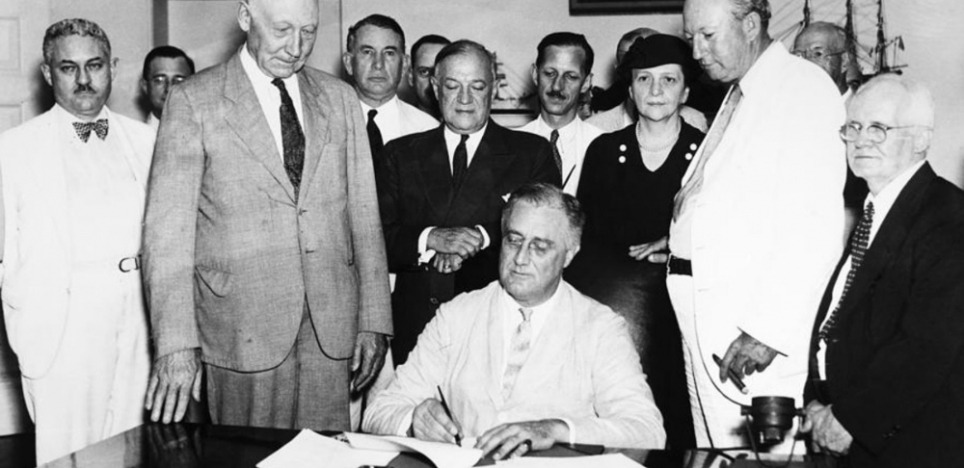In the 1930s, the United States was the only industrialized nation that did not have a system of Federal benefits for aged persons, the physically handicapped, and maternal and child welfare. Except for veterans' pensions, such concerns had been addressed only at the family, local, and state levels.
Widespread suffering during the Depression led to increased support for a federal measure. President Franklin Delano Roosevelt and Secretary of Labor Frances Perkins pushed hard for a pension program, and on August 14, 1935, The Social Security Act became law. The act had three parts:
- a payroll tax through which younger, healthier employees and their employers supported older retirees,
- the first unemployment insurance in the United States, so that people who lost their jobs could be paid until they could resume work, and
- support for dependent children and people with disabilities.
Criticism of the Social Security Act came from various directions. Some people said it didn't go far enough in supporting vulnerable groups of people. Others saw it as another example of the government meddling in personal lives. Despite these concerns, Social Security has survived and expanded over the years.
To Name This Day ...
 Quotes
Quotes
Let these quotes help you consider the advantages of social security as well as its flaws:
"This law represents a cornerstone in a structure which is being built but is by no means completed — a structure intended to lessen the force of possible future depressions, to act as a protection to future administrations of the Government against the necessity of going deeply into debt to furnish relief to the needy — a law to flatten out the peaks and valleys of deflation and of inflation — in other words, a law that will take care of human needs and at the same time provide for the United States an economic structure of vastly greater soundness."
— Franklin Delano Roosevelt, August 14, 1935
“I had already had a conviction, a ‘concern’, as the Quakers say, about social justice. And it was clear in my own mind that the promotion of social justice could be made to work practically.”
— Frances Perkins in The Roosevelt I Knew
“When President Roosevelt signed Social Security into law in 1935, 65 percent of African Americans nationally and between 70 and 80 percent in the South were ineligible.”
― Ta-Nehisi Coates in The Case for Reparations
 Spiritual Practice
Spiritual Practice
It's easy to take for granted programs that were put in place before we were born or when we were young. In his article "Frances Perkins: The Force behind Social Security," Bryce Covert points out how tirelessly and selflessly Secretary of Labor Frances Perkins had to work to overcome the troubles that plagued the passing of the Social Security Act. When FDR seemed to waver in his commitment to make this pension plan a solid priority, she reportedly "hit the roof" and redoubled her efforts, swaying him to tell the press that he was "tremendously" in favor of the bill.
Think about ways that you and your loved ones have benefited or stand to benefit from this legislation (or if you are not in the United States, from a similar program in your country). Then, in gratitude, redouble your own efforts to make something happen that seems almost beyond reach and in need of your stalwart support.
